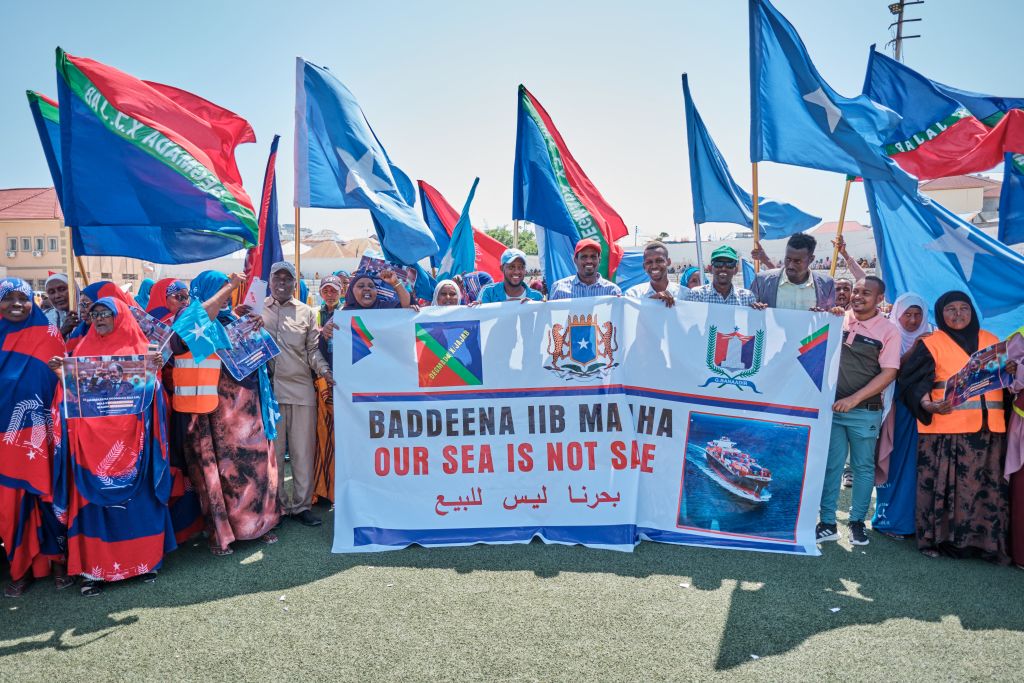ADF STAFF
What began as Ethiopia’s aspiration to regain access to the Red Sea turned into a threat of force against its coastal neighbors in late 2023 and is now fueling fears of war.
Last year, critics in the Horn of Africa region denounced Ethiopian Prime Minister Abiy Ahmed’s thinly veiled statements as intimidation.
He has called his landlocked country’s borders a “geographic prison” and referred to the Red Sea as Ethiopia’s “natural boundary.” He has urged Eritrea, Djibouti and Somalia to negotiate port access in order “to ensure lasting peace.”
“We want to get a port by peaceful means, but if that fails we will use force,” Abiy told a meeting of businessmen, according to Kenyan newspaper The Nation.
On January 1, 2024, Abiy took his plan a step further when he signed a pact with the breakaway region of Somaliland to lease port access.
“This is the good news we bring to all the people of Ethiopia, Somaliland and all the peace- and development-loving people,” Abiy said in a televised news conference with Somaliland President Muse Bihi Abdi in the Ethiopian capital, Addis Ababa.
The 50-year deal will see Somaliland lease 20 kilometers of coastland to Ethiopia for port access and to establish a naval base. In exchange, Ethiopia will give Somaliland an undisclosed number of shares of its state-run airline.
During the televised signing, Abdi delivered the surprising news when he said Ethiopia also will become the first country to recognize Somaliland as an independent nation.
“The entire region was up in arms about these statements,” Balqiis Insights senior Horn of Africa analyst Samira Gaid told The New York Times.
The wording of the memorandum of understanding, however, has not been made public and is not legally binding. Two days after the signing, the Ethiopian government attempted to clarify that the agreement only included “provisions … to make an in-depth assessment towards taking a position regarding the efforts of Somaliland to gain recognition.”
Anger and protests erupted throughout Somalia, as people called the move an act of aggression against Somali sovereignty.
“Not an inch of Somalia can or will be signed away by anybody,” Somali President Hassan Sheikh Mohamud vowed to parliament on January 2. “No one has the power to give away a piece of Somalia.”
There were protests across Somaliland as well.
“Ethiopia remains our number one enemy,” Abdiqani Mohamud Ateye, Somaliland’s defense minister, said during a local television interview on January 7 before submitting his resignation in protest of what he called improper negotiations. “Abiy Ahmed wants to take [the land] without renting or owning it.”
Somaliland declared independence from Somalia in 1991 but isn’t recognized by the African Union or the United Nations.
Ethiopia, the most populous landlocked country in the world, lost direct access to the Red Sea in 1993 when Eritrea gained independence after almost 30 years of war. More than 95% of Ethiopia’s imported goods come through the ports of Djibouti at a cost of about
$1.5 billion in annual fees.
The Somaliland territorial pact threatens additional conflict for Ethiopia, which has faced internal instability in its Oroma, Tigray and Amhara regions.
Egyptian Foreign Minister Sameh Shoukry, whose country has been entangled in a bitter dispute with Ethiopia over its damming of the Nile River, said the Somaliland deal was the latest in a series of unilateral actions by Ethiopia that fail to consider the interests of fellow African governments.
“It has vindicated the Egyptian view regarding the effect of these policies on regional stability and raising tension among its nations,” he told The National newspaper. “Ethiopia has become a source of unrest in its regional surroundings.”
Matt Bryden, strategic advisor for Sahan Research, a Kenya-based think tank, said the region is now scrambling to deal with the ripple effect of Abiy’s Somaliland deal.
“Egypt may resist Ethiopia’s ambitions to establish a naval presence in the Red Sea and Gulf of Aden,” he told The Associated Press. “Djibouti may perceive a threat to its commercial interests as Ethiopia’s principal port.
“Members of the African Union and Arab League will be lobbied by all parties to take positions. So, an escalation in political and diplomatic posturing on all sides is very likely.”






